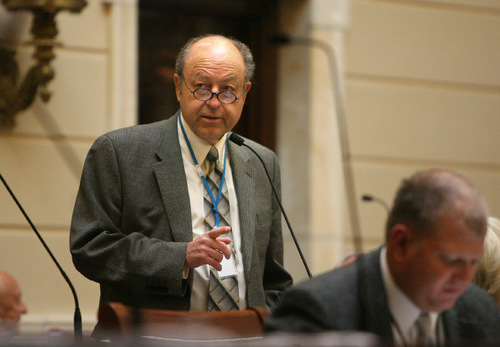This is an archived article that was published on sltrib.com in 2012, and information in the article may be outdated. It is provided only for personal research purposes and may not be reprinted.
The state's first minority judicial candidate in more than five years will go to a vote before the full Utah Senate on Wednesday despite being the first nominee in memory to be rejected by a Senate confirmation committee.
Su J. Chon is one of two attorneys appointed by Gov. Gary Herbert to replace two retiring judges in 3rd District Court, which includes Salt Lake City.
Herbert restated his support for Chon's candidacy Tuesday, sending a one-page fact sheet about her to senators and saying her 18 years of practicing law have given her "the skills and experience to be an outstanding judge."
In a Monday hearing, Senate Judicial Confirmation Committee members disagreed, raising concerns that Chon — who moved to the U.S. from Korea as a child and is now attorney for the state's Office of the Property Rights Ombudsman — lacked trial court or criminal law experience.
"I do believe you've got a little bit of a mountain to climb here," said Utah Senate Majority Leader Scott Jenkins, R-Plain City, who heads the committee. The members voted 4-2 against endorsing Chon.
But trial experience isn't a requirement for becoming a judge in Utah, and other sitting judges didn't have such experience before their confirmation, said Salt Lake City attorney and Utah Minority Bar Association member Mike Martinez.
"What message does that send to the minority legal community?" Martinez asked, speculating that Chon's job as advocate for property owners against developers might have hindered her chances. "That's going to have a very chilling effect on getting applications from minority people."
But Jenkins said Tuesday the vote was based solely on concerns over her inexperience.
"It had nothing to do with race or sex or anything else," Jenkins said. "It was just a lack of experience. That's it, for the most part, especially courtroom experience."
Jenkins said he recognized before the confirmation hearing that Chon might have problems with the panel and said he encouraged the governor's office to have her meet with some senators and try to build support before her confirmation hearing.
"It hurt us to vote no on this lady, because she's the American story. Her family is immigrants, they raised themselves out of poverty," he said, adding it was hard to vote against her while her family and parents were looking on. "I'm telling you, she's a wonderful person."
Now, heading into Wednesday's vote scheduled for 1:30 p.m., Jenkins said he expects the governor's staff to lobby legislators to support her, but he noted that senators give considerable deference to the confirmation committee's recommendation.
"I feel bad for her," Jenkins said, "because I feel like the governor put her in a position she couldn't win."
At Monday's committee hearing, Chon faced questions from the committee about property rights and her feelings on the Pledge of Allegiance being recited in public schools — a practice she said she supports.
"I know I may encounter different types of people, different cultures, different religious beliefs ... I will be tolerant of those people who come through my court," Chon told committee members.
"I was really impressed. I think everyone on the committee was really impressed with her personally, with her experience and integrity," said Sen. Lyle W. Hillyard, R-Logan, who voted for Chon. "The thing she can't overcome is the concern that she really has no trial court experience."
Hillyard said he doesn't know how the vote will go Wednesday. He said he plans to support her, "but I'm not going to go out and fall on the sword."
Only five of the state's 71 district judges are racial or ethnic minorities, according to the Administrative Office of the Courts.
Chon is the first minority attorney appointed since 3rd District Judge Vernice Trease's name was advanced in late 2006, Martinez said, and is the only minority among Herbert's 25 judicial nominations.
Hers was one of two names put forth by Herbert to replace two retiring 3rd District judges, Judge Sandra Peuler, one of the state's female judges, and Judge Tyrone Medley, the state's first and only black judge.
The Utah Minority Bar had called on the judicial nominating commission to give serious consideration to minority candidates.
The only other gubernatorial appointee to be denied confirmation was 3rd District Judge Robert Hilder in 2008.
Hilder — who had ruled in favor of a controversial gun ban at the University of Utah — was narrowly endorsed by the judicial confirmation committee, but he was rejected by the full Senate for a spot on the state's appeals court.
While occasionally something "negative" is discovered in the confirmation process and an appointee withdraws his or her name, this is the first time in memory that a judicial appointment has been rejected by the confirmation committee, said Ric Cantrell, Utah chief Senate deputy.
Chon graduated from Brigham Young University's law school and also was an attorney at Callister, Nebeker & McCullough in Salt Lake City before joining the state's Office of Property Rights.
Herbert praised Chon's work in that role, specifically her "excellent demeanor and diligence when conducting arbitrations and mediations," and pointing out she has been named among of Utah's Legal Elite by Utah Business Magazine and honored as a "rising star" by the Rocky Mountain Super Lawyers in 2008.
She currently serves as a commissioner of the Utah State Bar and has volunteered as the executive director over the Multi-Cultural Legal Center.
Chon declined to comment Tuesday afternoon.
The other nominee, James T. Blanch, was approved by the committee. It was the Harvard graduate's fourth time submitting his name to be considered for a judgeship.
Along with Hillyard, Karen Mayne, D-West Valley City, voted for Chon, while Jenkins, Mark Madsen, R-Eagle Mountain, Daniel Thatcher, R-West Valley City, and Senate President Michael Waddoups, R-Taylorsville, voted against her.
lwhitehurst@sltrib.com Twitter: @lwhitehurst
Robert Gehrke and Nate Carlisle contributed to this report. Statement from Utah Minority Bar Association:
"The Utah Minority Bar Association (UMBA) fully endorses Su J. Chon, Governor Gary Herbert's judicial nominee, to the Third District Court bench and asks that members of the Utah Senate also support the appointment of Ms. Chon.
"Ms. Chon was vetted by the Third District Nominating Commission and the Governor's Office and is a qualified and experienced attorney with over eighteen years of legal experience, who will bring much needed diversity to the judiciary system.
"Currently serving as a Bar Commissioner with the Utah State Bar, Ms. Chon also has an impressive history of volunteer and community work.
"The Utah Minority Bar Association hopes that the members of the Utah Senate will see the broader picture and the increasing need for diversity on the bench. Currently, our judiciary system is not representative of the community that comes before it for just and independent resolution of legal problems.
"We stand behind the Governor's nominee and call upon the members of the Senate to do the same."
Jesse M. Nix, President-Elect





